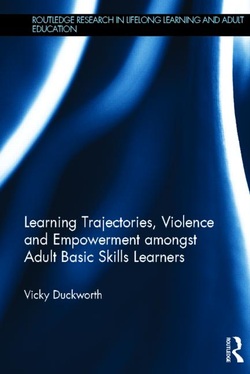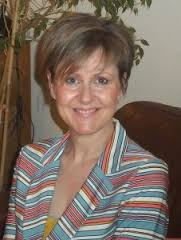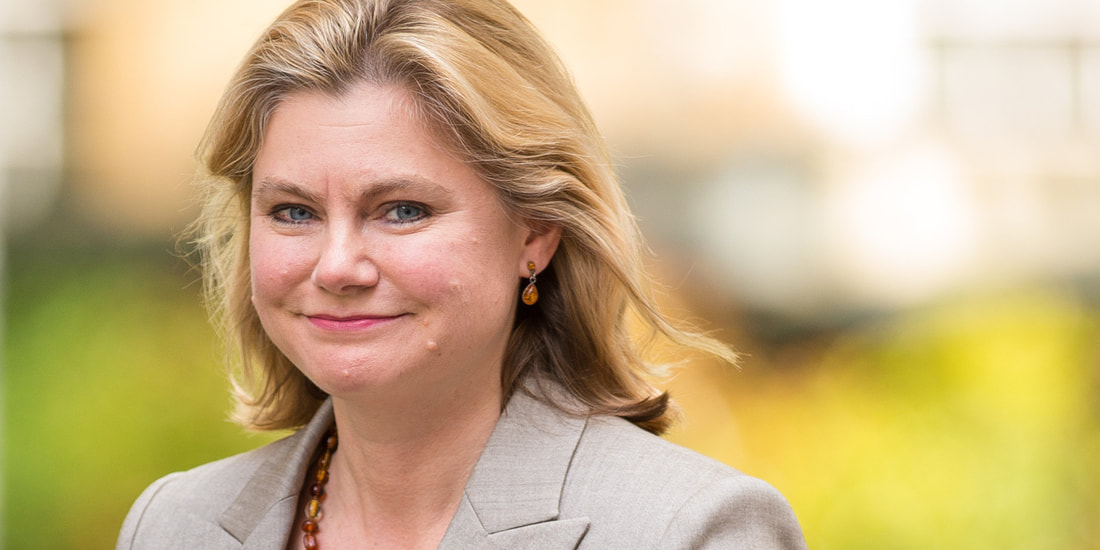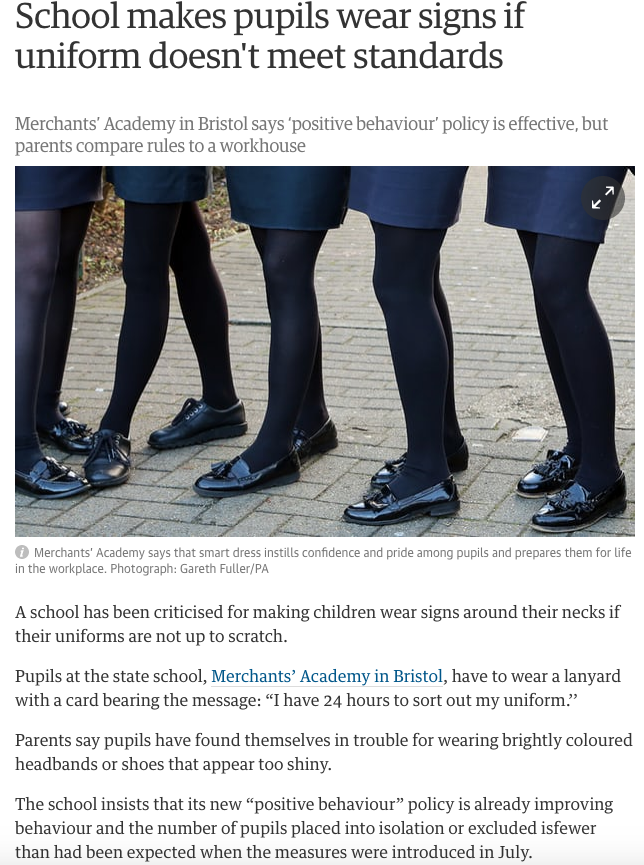|
Justine Greening has announced £1.3 billion of additional funding for schools over the next two years – promising to maintain per-pupil funding in real terms until 2019-20. Apparently much of this is coming from the free schools budget - fair enough. But the rest is from 'efficiency savings'. So is there really any 'new' money? I think not.
0 Comments
This is , I think, quite extraordinary. One of the issues has been that the pupils have to wear shoes that are 'polishable' - what an interesting rule. Does that mean no patent (apparently some shoes are too shiny) or suede? And what is so great about polishable shoes? No idea.
I don't think I would ever call this a positive behaviour policy, so again, what an extraordinary use of language. What I should prefer to see is rules negotiated and agreed (with staff, governors, pupils and parents), sensibly enforced, and most of all, without humiliating pupils. Article taken from the Guardian, 17 July 2017  Vicky Duckworth's book on the learning trajectories of adult basic skills learners - very powerful and important. Let me tell you a story…. Yesterday, I was privileged to be invited to attend a seminar given by my good friend Dr Vicky Duckworth. I have had many fabulous conversations with Vicky over the last few years, and I have always been impressed with her work and thinking. I was flattered and honoured recently to be given a signed copy of her book, which is essentially an adapted version of her thesis. The book- and the seminar- are entitled ‘Learning Trajectories, violence and empowerment amongst Adult basic skills learners’. My own research is concerned with the lived realities of teachers’ lives, and one of the things that interested me is the integration – or lack of it between personal and professional identity in teachers. I’m also interested in the dual nature of professional identity – or sometimes even the hybrid nature of professional identities. As I've got to know Vicky better, I have been amazed at how she, in common with many other women, juggles a personal and a professional life; in fact she juggles more than one professional life, one as a teacher educator of note and one as an academic, with impressive list of publications, including peer refereed journal articles and books, to her name. Vicky’s paper, at the prestigious department for educational research at the University of Lancaster, concerned the learning trajectories of adult basic skills learners in Oldham, and uses Bourdieu’s thinking tools to consider issues such as symbolic violence and empowerment in such learners. The research is participatory action research. This is partly because, I guess, of the nature of the topic, but also it reflects something about the Vicky’s ontological and epistemological stance, about her approach to life, her inclusive approach to her students and to the nature of learning. As well, it illustrates Vicky’s belief that if she is asking students to give so much of themselves in relation ot their learning and the participatory research, she has to give a good deal back. Sometimes, this is in terms of the amount of work, preparation, and energy she puts into her teaching, and at other times this message may be more personal self-disclosure about her own learning journey. Unusually for a formal seminar given at one of the top 10 universities in the country, Dr. Duckworth brought with her and had invited a number of significant people who were important to her. I was one of those people, and perhaps in many ways that is not so surprising, as I am myself working in the field of educational research; I do consider myself to be a friend of Vicky’s, but I might well have attend such a seminar anyway. However, a very close and old friend of Vicky’s, Michelle, who is working in community health, also came to the seminar, as did Vicky’s 10-year-old daughter, Niamh; and Sophie, a young relative of Vicky’s, who took an active and interested part in the seminar butt was also interested in looking round Lancaster University as it was a possibility that she might study there in the future. As well, two of Vicky’s teacher trainees from her initial teacher education course had made the journey to Lancaster to attend the seminar. In addition to these people, there were a number of well established and well-known researchers from the University of Lancaster at the seminar, which was videoed and which will be published on University website. So all in all, it was a varied, interested, knowledgeable and supportive audience. One of the things that is a theme in Vicky’s work, is the idea of education as empowering; and the book as well as all of Vicky’s work, is an impassioned and exceptionally powerful account of the learning journeys which learners in in a marginalised community in a northern mill town undertook, and of the the barriers and struggles which beset them along the way. I have myself struggled with a lot of the work of Bourdieu, but Vicky uses his thinking tools with facility to analyse and explain the narratives of the basic skills learners with whom she was working, and to put a significant amount of emphasis on the capitals which are held and developed by such learners and which both constrain and enable some of the individuals in their learning journeys through the education system. Vicky’s own journey was something which was also mentioned, and which is significant. Vicky grew up in the same town, in a family where she was one of the first to go to college and university, having had a background where education had not been a priority. She started off as a nurse and midwife, and then became a tutor and program leader delivering literacy in a large FE college in the north of England. She is now a successful teacher educator, author, academic, friend, wife, mother; a multiplicity of roles which she carries out with facility, authenticity and integrity. The seminar itself was fascinating; talking to Vicky about her work always is, and always makes me think. However, the thing is I can’t get over, is how what Vicky was saying about empowering her adult basic skills learners, and in their developing resistance to some of the agendas and to the constraints of some of the factors which impact on their lives, was also being played out very graphically in microcosm, in front of us. Vicky’s younger daughter, Niamh, was with this. She is an intelligent young woman; although still at primary school, she has a wisdom which belies her years. What was fascinating was to see that this young woman was completely at home in the rather rarefied environment in which she found herself. Being only 10, of course she was fascinated with a laser pointer. But she also chatted to participants of the seminar in an articulate and friendly fashion. Unlike the stereotypical 10-year-old, she sat and listened to her mother’s presentation (and quite clearly had listened), throughout the initial presentation. And then when the questions were being asked, Niamh raised her hand. The chair, Carolyn Jackson, is Professor of education, with a particular interest in gender and education, asked Niamh to speak. The question which Niamh asked was one which would have done any of the participants for the seminar proud. It concerns labeling. One of Vicky's points is that Bourdieu’s concept of symbolic violence has limitations in that it does not really engage with the nature of labelling as a symbolic act of violence. Vicky expands and draws on Bourdieu’s notion of symbolic capital to include the work of sociologists such as Howard Becker and Erving Goffman and their work on labeling. Vicky’s work refers to and analyses the dominant symbolic power of schooling and labeling which had in many ways pathologised the learners with whom she had worked. Niamh’s question was very perceptive. She asked whether there were in fact any learners in her mother’s classes who had not been labelled, and if so what had been happening to them, how had they behaved, and she wanted to know whether the non-labelling was significant. This is an important question, and one which would bear a considerable amount of further analysis. Vicky, the academic as well as the mother, answered this question thoughtfully, courteously and she, as well as the rest of us acknowledged the importance of the imput from this young woman. As I drove home, there are many things which came to my mind. But the one image that I will always have in my mind, is an almost eidetic image of a young 10-year-old woman, raising her hand in a seminar of distinguished people, to ask a question of her mother, also a significant academic and thinker. If I learned nothing else yesterday, I did see, in very concrete terms, that the cultural capital which was gained by Vicky in her time in education as well as subsequently, interacting with the social and other forms of capital capital, had resulted in her daughter having a significant amount of social capital which gave her the confidence to ask a question , and one which was sensible, in what was in many ways a very intimidating environment; and to be able to hold her own in an environment where many young women of Niamh’s age might has been sitting drawing, playing a game on a phone, or possibly listening to music quietly in the background. If a clearer demonstration of the fact that capital reproduces, and education is empowering and emancipating, were needed, then I cannot think what it could be. It was intensely emotional and moving to watch Vicky and her daughter interact in what could have been a very intimidating environment for Niamh, and it demonstrated so clearly that Vicky’s own resistance and empowerment had resulted in Niamh having such capitals. We know that there is a distinctive cultural pattern of social reproduction in relation to learners’ choices in many cases, and the example of Vicky and Niamh, show that in fact Vicky’s own resistance and learning journey resulted in her developing a relationship with her daughter where her daughter was empowered to ask a relevant, articulate, and interesting question about labeling in a seminar. I wish I could explain in a more articulate way how powerful and moving that was to see, and what a wonderful illustration Vicky and her family and support network are of her own thesis, and how she and her relationships with her family and her friends exemplify the empowering nature of education and of caring capital. That picture will stay with me forever. Thank you, Vicky and Niamh. Details of Vicky's book can be found here .  Dr. Vicky Duckworth |
About me...
I was a psychology and social sciences teacher for many years and now I am in the throes of a leadership, teaching and research career in HE. I care passionately about education. This blog will show you why and how.
Categories
All
Archives
March 2023
|



 RSS Feed
RSS Feed